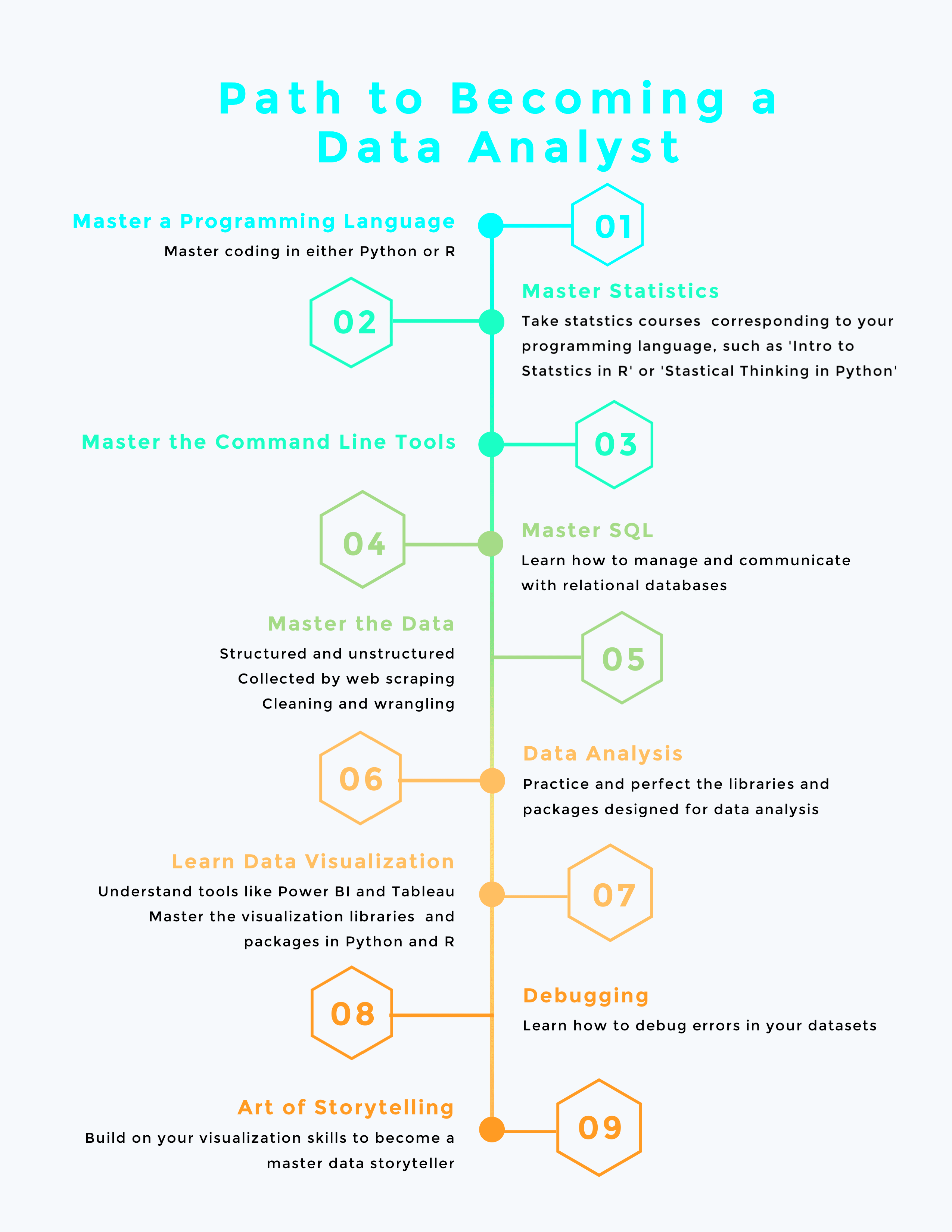Becoming a freelance data analyst can be an exciting career move. This role involves collecting, processing, and analyzing data to help businesses make informed decisions. As a freelance data analyst, you work independently with various clients, providing insights and recommendations based on data analysis. Your expertise can assist companies in improving their operations, marketing strategies, and overall performance. You will need to communicate your findings clearly and effectively to clients who may not have a technical background. This is where your skills as a communicator become just as important as your analytical abilities.
Building the Necessary Skills for Data Analysis

To succeed as a freelance data analyst, you'll need a strong skill set that includes:
- Statistical Analysis: Understanding basic statistics helps you analyze data trends and draw meaningful conclusions.
- Data Visualization: Tools like Tableau or Power BI enable you to present data in an engaging way.
- Programming Languages: Familiarity with languages like Python or R can enhance your data manipulation capabilities.
- Excel Proficiency: Excel remains a key tool for data analysis and is widely used across industries.
- Database Management: Knowledge of SQL is essential for retrieving and managing data stored in databases.
Consider taking online courses or attending workshops to enhance these skills. Practical experience is also vital, so seek out internships or volunteer opportunities to apply what you learn in real-world situations.
Also Read This: Who Are Fiverr’s Competitors?
Creating a Portfolio to Showcase Your Work

A strong portfolio is crucial for attracting clients as a freelance data analyst. Your portfolio should demonstrate your skills and show potential clients what you can do. Here are some tips for building an impressive portfolio:
- Select Diverse Projects: Include a variety of projects that highlight different skills, such as data cleaning, analysis, and visualization.
- Include Case Studies: Write brief case studies for each project. Explain the problem you addressed, your approach, and the results you achieved.
- Show Visuals: Use charts, graphs, and tables to make your findings easy to understand. Visuals can make your portfolio more engaging.
- Highlight Tools Used: Mention the tools and programming languages you used in each project. This helps clients understand your technical capabilities.
Consider using platforms like GitHub or personal websites to host your portfolio. Keep it updated with your latest work to reflect your evolving skills and experience.
Also Read This: How to Contact Seller on Fiverr After Marking Order Complete
Finding Freelance Data Analysis Opportunities
Finding freelance data analysis opportunities is a crucial step in building your career. The freelance market is vast, with many companies looking for skilled data analysts. To tap into these opportunities, you can explore various channels. Networking, online platforms, and job boards are all excellent places to start your search. You can also connect with businesses directly to pitch your services. Here are some effective ways to find freelance gigs:
- Freelance Websites: Platforms like Upwork, Fiverr, and Freelancer offer numerous job listings specifically for data analysts.
- LinkedIn: This professional networking site is a great place to showcase your skills, connect with industry professionals, and find job postings.
- Networking Events: Attend industry conferences, seminars, and local meetups to meet potential clients and fellow freelancers.
- Referrals: Ask past clients or colleagues for referrals. Personal recommendations can lead to valuable opportunities.
- Social Media Groups: Join Facebook and LinkedIn groups focused on freelancing and data analysis to stay updated on job openings.
By diversifying your approach to finding opportunities, you increase your chances of landing freelance gigs. Stay persistent and keep applying until you find the right fit.
Also Read This: How to Get Extension on Fiverr
Setting Your Rates as a Freelance Data Analyst
Setting your rates as a freelance data analyst can be challenging but is essential for your business. You want to be competitive while also ensuring you are compensated fairly for your skills and experience. Here are some factors to consider when determining your rates:
- Your Experience Level: Beginners may start with lower rates, while experienced analysts can charge more based on their expertise.
- Market Rates: Research what other freelance data analysts in your area or niche are charging. Websites like Glassdoor can provide insights.
- Project Complexity: More complex projects should command higher rates due to the increased effort and skill required.
- Client Budget: Some clients have limited budgets, so be prepared to negotiate while ensuring you don’t undervalue your work.
A common pricing structure is to charge hourly or per project. For example:
| Experience Level | Hourly Rate | Project Rate (Average) |
|---|---|---|
| Beginner | $25 - $50 | $300 - $600 |
| Intermediate | $50 - $100 | $600 - $1,200 |
| Expert | $100+ | $1,200+ |
Setting your rates appropriately can help you attract clients and maintain a sustainable freelance career.
Also Read This: How to Logout on Fiverr Remotely
Marketing Yourself as a Freelance Data Analyst
Marketing yourself effectively is key to building a successful freelance data analysis career. You need to make potential clients aware of your skills and what you offer. Here are some strategies to help you market yourself:
- Build a Personal Brand: Create a professional online presence through a website or blog. Share your insights on data analysis topics.
- Optimize Your LinkedIn Profile: Highlight your skills, projects, and experiences. Engage with posts in your field to increase visibility.
- Networking: Attend industry events and connect with potential clients. Building relationships can lead to referrals and new opportunities.
- Content Creation: Share your expertise through articles, infographics, or videos. Teaching others can position you as an authority in your field.
- Social Media Presence: Use platforms like Twitter and Instagram to share your projects and insights. Engage with others in your industry.
Remember, consistent marketing is essential. Keep promoting yourself and your services, and don’t hesitate to reach out to potential clients directly. Your efforts will help you stand out in a competitive market.
Also Read This: How to Rate a Buyer on Fiverr
Managing Client Relationships Effectively
Managing client relationships is crucial for freelance data analysts. Building and maintaining strong relationships can lead to repeat business and referrals. Good communication and trust are the cornerstones of these relationships. Here are some tips to help you manage your client interactions:
- Set Clear Expectations: At the beginning of each project, outline your deliverables, timelines, and payment terms. This clarity helps avoid misunderstandings later.
- Communicate Regularly: Keep clients updated on your progress. Regular check-ins can reassure them and give them the chance to provide feedback.
- Be Responsive: Respond to emails and inquiries promptly. This shows your clients that you value their time and are committed to their project.
- Request Feedback: After completing a project, ask for feedback. This not only helps you improve but also shows clients you care about their opinions.
- Follow Up: After a project, check in to see how your analysis has helped them. This can open doors for future work.
Remember, a satisfied client is likely to return for more work and refer you to others. Building strong relationships can greatly enhance your freelance career.
Also Read This: How to Make Money with Fiverr in Nigeria
Tips for Continuous Improvement in Data Analysis
Continuous improvement is key to staying relevant as a freelance data analyst. The field is always evolving, with new tools and techniques emerging regularly. Here are some strategies for ongoing development:
- Stay Updated: Follow industry blogs, podcasts, and forums to keep up with the latest trends in data analysis.
- Take Online Courses: Platforms like Coursera and Udacity offer courses that can enhance your skills and knowledge. Consider focusing on advanced analytics or machine learning.
- Network with Peers: Join data analyst communities or attend meetups. Learning from others can provide new insights and techniques.
- Practice Regularly: Take on personal projects or volunteer to analyze data for non-profits. This real-world experience can solidify your skills.
- Seek Mentorship: Find a mentor in the field who can guide you and provide valuable feedback on your work.
By committing to continuous improvement, you’ll enhance your value as a freelancer and be better equipped to meet your clients' needs.
Also Read This: Can I Transfer My Fiverr Money Into My Bank?
Frequently Asked Questions
As a freelance data analyst, you may have some common questions. Here are answers to a few frequently asked questions:
- What skills do I need to start as a freelance data analyst? You should have a strong foundation in statistics, data visualization, programming languages like Python or R, and database management with SQL.
- How can I find clients? Use freelance websites, network through LinkedIn, and attend industry events to connect with potential clients.
- What should I include in my portfolio? Your portfolio should showcase a variety of projects, case studies, and data visualizations to highlight your skills.
- How much should I charge for my services? Rates vary based on experience and project complexity. Research market rates to set competitive pricing.
- How can I ensure a good working relationship with clients? Communicate openly, set clear expectations, and regularly seek feedback to maintain a positive relationship.
If you have more questions, don't hesitate to reach out to fellow analysts or engage in online communities. The freelance journey is filled with learning opportunities!
Conclusion
Becoming a successful freelance data analyst is an exciting journey filled with opportunities. By understanding your role, building essential skills, and effectively managing client relationships, you can thrive in this competitive field. Remember to continuously improve your expertise and market yourself to find the best opportunities. A strong portfolio and good communication are key to attracting clients and retaining them for future projects. Stay engaged with the community, embrace learning, and don’t hesitate to seek support from peers and mentors. With dedication and strategic planning, you can build a rewarding career as a freelance data analyst.




